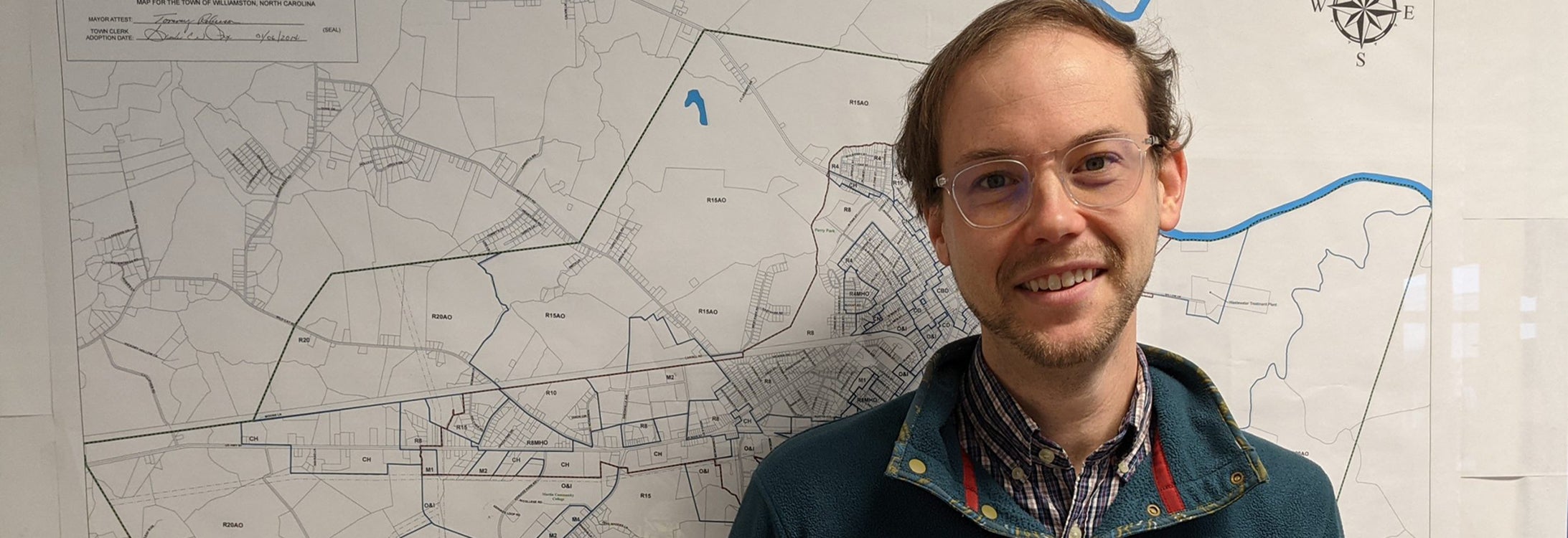Zachary Dickerson (MS 2018)
Current Position & Responsibilities
“Primarily, I work for the Planning and Zoning Department for the Town of Williamston. This involves reviewing site maps, processing zoning permits and ensuring Zoning Ordinances are met. Occasionally, I assist in Code Enforcement. Working in Town Hall, we also serve as a local 411/information center. A large part of my job entails customer service. On the downtown side, I am the director of Williamston Downtown Inc., a 501 (c) (3) organization which is part of the North Carolina Main Street Program. Williamston Downtown Inc. works to revitalize historic downtown Williamston, assisting with grant applications and offering small grants through a local Vibrancy Grant program. They also plan events throughout the year downtown, including Downtown Cleanup Days, Movies in the Park and partner with the Martin County Main Street Market, which brings a farmer’s market downtown in the summer. I work directly with business and property owners to assess their needs and connect them to the resources they can use to develop their business or renovate their building. As director, I am responsible for serving as a liaison between the state and local entities, and have worked with the North Carolina Department of Commerce to implement Community Development Block Grants in downtown Williamston. On any given day, if I am not in City Hall, one can usually find me walking down Main Street, working directly with a local business, the Martin County Chamber of Commerce and Martin County Tourism.”
What are the most rewarding and/or most challenging aspects of your work?
“By far, the most rewarding aspect of this job is watching a project I’ve worked on for months finally come to fruition. The ribbon cutting after months of planning and paperwork is an accomplished feeling. I also genuinely enjoy being a public servant. Being a part of what makes a city work is rewarding in and of itself. With downtown development, it’s seeing the small changes over time build up to a better downtown. I often tell people that 1. Nothing happens overnight and 2. Community is not a spectator sport. Seeing more local people get excited about downtown and getting involved is a huge plus. A major challenge has been dealing with the general economic situation of Northeastern North Carolina. When roughly 35% of the Town’s population lives below the Federal Poverty Line, it sometimes feels like we have bigger fish to fry than opening one new business or repairing an awning. Before people started becoming interested in downtown again, there was a general air of apathy which imbued the Town’s culture. Working to change that has been the number one challenge for me here. Physical improvements can be seen visually, but attitude changes are subjective and take time. We still have a long way to go here, but it is improving.”
How did your degree(s) in Geography prepare you for this position?
“Besides the knowledge gained through classes, I think the two most important things one can learn in a University is 1. How to defend your knowledge and 2. Time management. My bachelor’s degree is in International Relations, where I learned a lot about political science and diplomacy. Translating that into public service skills has served me very well when it comes to working with the public. My graduate degree in Geography helped me with the more specific aspects of my work, especially on the planning side. Working with GIS, reading maps on a granular level and a better understanding of statistics have all proven helpful for this work. The combination of working as a Graduate Assistant and taking courses as a student at the same time prepared me for balancing several things at once, which I do daily in my double role in the Planning Department and as Downtown Director.”
What else do students need to learn (beyond the degree) and who should they be talking to in preparation for entering the job market?
“I don’t want to beat a dead horse, but customer service skills go a long way in any job. They’re not really something one can learn in a classroom, but come from experience. Especially in a capacity working with the public, you’re interacting with people every day, fielding questions that sometimes you won’t know how to answer. Handling those challenges and demands in a tactful and professional way will serve well working in government, no matter the level. If a student is planning to work for a city or a county, I highly recommend going to a Town Hall/City Hall meeting. This is a great way to get a taste of local government. They are even more accessible now, since many Towns and Counties have moved to virtual meetings.”
What was your favorite or most memorable experience?
“I have two most memorable experiences. The first, conducting an independent study with Dr. Hur and two other students. We carved out our topic (focusing on people who were displaced by Hurricane Floyd and again in Hurricane Matthew, North of the Tar River) and went out into the field to gather data. Having the experience of conducting research in this capacity was new for me, and Dr. Hur was a wonderful professor to work with. The group made several memories working in the field, and the experience prepared me to conduct research for my eventual thesis (for which Dr. Hur was my advisor), which also involved several interviews and surveys. Secondly, attending the AAG Conference in spring 2018 in New Orleans. Being in a new city is always a great experience, but meeting people in the field from all over the world in such a special and unique city drove home for me that I was in the right field. Not to mention the beignets!”
